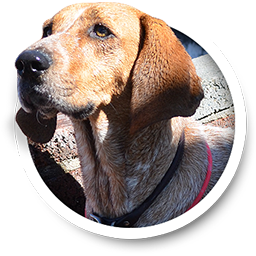 Whoa, put the brakes on and take a break! Cayenne here and today we will bark about brakes and brake rotor service.
Whoa, put the brakes on and take a break! Cayenne here and today we will bark about brakes and brake rotor service.
Think of how much abuse your brakes take. Day in and day out, they stop your vehicle when it's going fast and when it's going slow. Maybe your vehicle has been vibrating when you brake, or maybe it seems like your stopping distance is a little bit longer than it used to be.
Then it's time to get your brakes checked out. After all, you have to be able to stop if you want to be safe. Nearly all newer vehicles have disc brakes on the front, and many have that type of brake on all four wheels. That makes it likely you'll be getting disc brakes fixed at some time in your vehicle's lifetime.
Knowing how disc brakes work is as easy as riding a bicycle. If your bike had hand brakes, you'll probably remember a mechanism that squeezed a couple of pads on each side of your bicycle wheel when you applied the brakes. Disc brakes are similar; but instead of the bike wheel, there's a metal disc instead. If that disc is warped or has irregularities in it, it's going to vibrate.
It used to be that rotors were thick, and when they warped, a technician could "turn" them to scrape off a layer of metal so their sides were straight again. The latest vehicles are using thinner, lighter rotors with a slightly different construction. Now, it's likely that rotors that are resurfaced this way will not have enough metal left to work safely. In fact, some manufacturers advise only replacing rotors that are worn out.
Newer designs have reduced rotor prices, and in many cases, the labor cost of turning the rotors is higher than buying new. There are times, though, where your rotors can be resurfaced and still meet manufacturer specifications.
If you have a rotor replaced on one side of your vehicle, it might be a good idea to replace rotors on the other side, too.
Maybe you're looking for the new rotors to last longer than the ones that were on there. New technologies can offer a longer lifespan in a premium rotor. Armed with knowing the type of driving you do, you and your Allied Auto Works service advisor can make the best decision on which direction you want to go with your new brakes.
We all need a little break,
Cayenne

Allied Auto Works
2073 Grant Road
Los Altos, CA 94024
650.968.7227
http://www.alliedautoworks.com